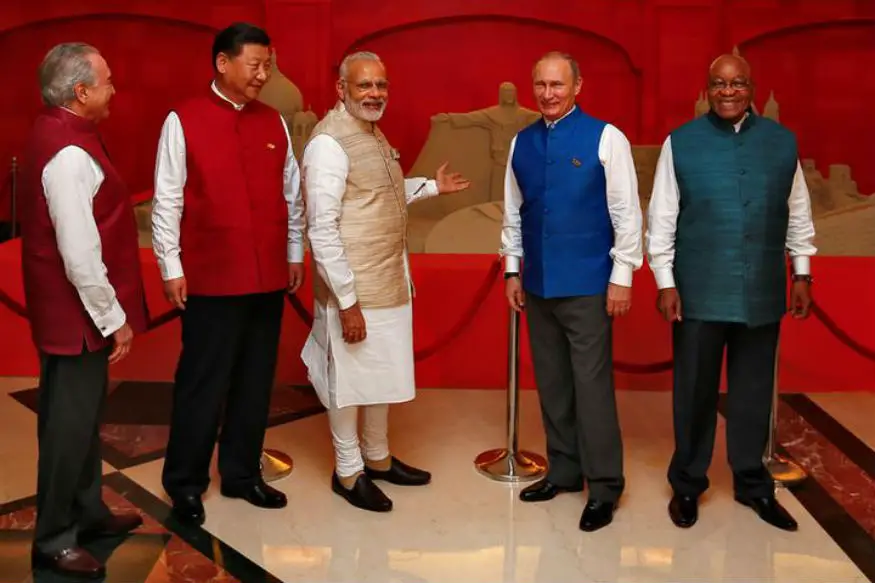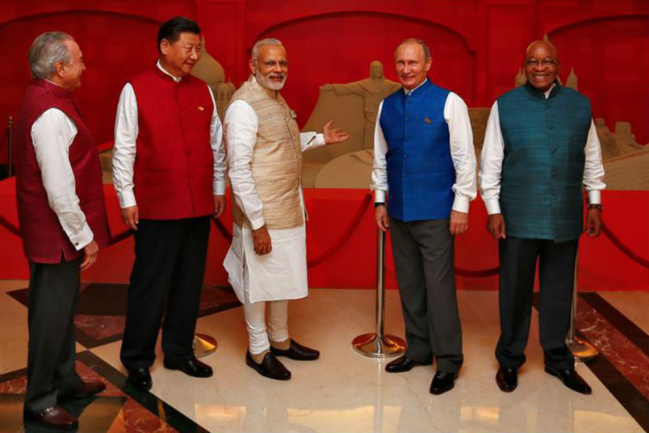By Chu Yin Source: People's Daily and Global Times
The BRICS Summit, an increasingly high-profile gathering of leaders from the emerging-market BRICS countries, is becoming a key driver of globalization. At the same time, the US presidential race appears to be soaked with isolationism and European integration is being shaken by the aftermath of Brexit.
Admittedly, BRICS nations have suffered some difficulties amid a worldwide economic downturn, prompting some to think that the BRICS are losing their luster. However, the emerging-market bloc has been transformed from a loose concept into a truly influential entity, and it is having an important impact on the world's order and globalization.
First, in the political sphere, the BRICS are helping to change the way in which the global governance model has always been centered around Western developed economies. The bloc has changed the post-Cold War world order, in which the global dominance of the US was enshrined, and has more broadly resisted the global hegemony of Western nations. BRICS nations, spanning Europe, Asia, Africa and Latin America, are of pivotal significance for containing Western influence and neo-colonial control, as well as for rectifying the unfair and unrighteous global governance regime.
The grouping of BRICS nations indicates not only a union of the new powers that have been marginalized by the West, but also an attempt to acknowledge diversity. Especially worth noting is that BRICS nations play a vital role in ensuring regional stability. Along with the decline of the US' hegemonic power, the BRICS' stabilizing influence is seen as increasingly important.
Second, in economic terms, the BRICS bloc has taken a raft of measures - including the signing of trade deals and currency agreements and the establishment of the BRICS bank - that have dramatically boosted the economic power of non-Western regions and also reshaped globalization. It turns out that BRICS nations have become a key growth engine for the world economy, and this has resulted in a trend that is seeing globalization returning to nurture Third World countries. Brazil, Russia, India and South Africa - the four BRICS nations other than China - are all key partners for China in pushing forward its national strategy of "One Belt and One Road." It is expected that with closer cooperation within BRICS nations, the China-led Belt and Road initiative will have an increasingly positive impact on the world, especially the Third World. Countries like Cambodia, Bangladesh and Angola that have long been among the economically marginalized across the globe have engaged themselves in the ongoing globalization driven by BRICS nations and are thus genuinely kicking off their process of modernization.
Last, in terms of culture, the BRICS bloc has allowed for increased communication and integration among each other, giving rise to new thoughts and cultures marked by openness, inclusiveness, cooperation and an all-win situation. BRICS nations all have long histories and distinct cultures, but their confidence in their own cultural values and beliefs, as well as their choice of development paths, has at times been affected by the West-centric globalization pattern. But with BRICS nations undergoing a political and economic revival, a more open and diverse attitude is on the rise. The BRICS countries have an attitude of mutual respect and appreciation, and can help the world grapple with the challenges of modernization.
There is still substantial room for greater cooperation among the BRICS nations, but it needs to be pointed out that institutional obstacles remain. India, Brazil and Russia have not always been truly open in the fields of taxation, labor protection and foreign exchange control, and there are some narrow-minded populist sentiments opposing Chinese investment in these countries. On top of that, despite the well-established industrial chains within BRICS nations, some of them still hold impractical views about building their own systems and excluding China's influence. If such impediments can't be removed, it will be hard for the BRICS to embark upon fully open development.
(The author is an associate professor at the University of International Relations and a researcher at the Center for China and Globalization.)
Admittedly, BRICS nations have suffered some difficulties amid a worldwide economic downturn, prompting some to think that the BRICS are losing their luster. However, the emerging-market bloc has been transformed from a loose concept into a truly influential entity, and it is having an important impact on the world's order and globalization.
First, in the political sphere, the BRICS are helping to change the way in which the global governance model has always been centered around Western developed economies. The bloc has changed the post-Cold War world order, in which the global dominance of the US was enshrined, and has more broadly resisted the global hegemony of Western nations. BRICS nations, spanning Europe, Asia, Africa and Latin America, are of pivotal significance for containing Western influence and neo-colonial control, as well as for rectifying the unfair and unrighteous global governance regime.
The grouping of BRICS nations indicates not only a union of the new powers that have been marginalized by the West, but also an attempt to acknowledge diversity. Especially worth noting is that BRICS nations play a vital role in ensuring regional stability. Along with the decline of the US' hegemonic power, the BRICS' stabilizing influence is seen as increasingly important.
Second, in economic terms, the BRICS bloc has taken a raft of measures - including the signing of trade deals and currency agreements and the establishment of the BRICS bank - that have dramatically boosted the economic power of non-Western regions and also reshaped globalization. It turns out that BRICS nations have become a key growth engine for the world economy, and this has resulted in a trend that is seeing globalization returning to nurture Third World countries. Brazil, Russia, India and South Africa - the four BRICS nations other than China - are all key partners for China in pushing forward its national strategy of "One Belt and One Road." It is expected that with closer cooperation within BRICS nations, the China-led Belt and Road initiative will have an increasingly positive impact on the world, especially the Third World. Countries like Cambodia, Bangladesh and Angola that have long been among the economically marginalized across the globe have engaged themselves in the ongoing globalization driven by BRICS nations and are thus genuinely kicking off their process of modernization.
Last, in terms of culture, the BRICS bloc has allowed for increased communication and integration among each other, giving rise to new thoughts and cultures marked by openness, inclusiveness, cooperation and an all-win situation. BRICS nations all have long histories and distinct cultures, but their confidence in their own cultural values and beliefs, as well as their choice of development paths, has at times been affected by the West-centric globalization pattern. But with BRICS nations undergoing a political and economic revival, a more open and diverse attitude is on the rise. The BRICS countries have an attitude of mutual respect and appreciation, and can help the world grapple with the challenges of modernization.
There is still substantial room for greater cooperation among the BRICS nations, but it needs to be pointed out that institutional obstacles remain. India, Brazil and Russia have not always been truly open in the fields of taxation, labor protection and foreign exchange control, and there are some narrow-minded populist sentiments opposing Chinese investment in these countries. On top of that, despite the well-established industrial chains within BRICS nations, some of them still hold impractical views about building their own systems and excluding China's influence. If such impediments can't be removed, it will be hard for the BRICS to embark upon fully open development.
(The author is an associate professor at the University of International Relations and a researcher at the Center for China and Globalization.)
 Menu
Menu
 BRICS create balancing influence in world affairs
BRICS create balancing influence in world affairs

















